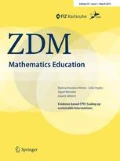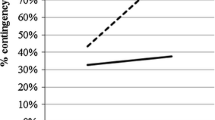Abstract
Whereas much is known about designing effective continuous professional development (CPD) for teachers, little is known about spillover effects of CPD by fostering collegial interactions. In this respect, the self-efficacy expectancy of multipliers to spread CPD issues within their own school is an important predictor for scaling. Self-efficacy can be fostered through various sources within CPD courses, including role-plays and practice phases to test issues. One essential endeavor lies in initiating collaboration in professional learning communities (PLCs). The study discussed here focuses on two courses explicitly supporting multipliers to actively engage in PLCs. In a pre/post-design, participants’ development of self-efficacy was measured in relation to collaboration, and compared with that of a control group. As instrument we applied an adapted version of the self-efficacy scale by Schwarzer and Jerusalem (Skalen zur Erfassung von Lehrer- und Schülermerkmalen, (1999), which yielded a high internal reliability (Cr alpha = 0.950). Our results point to different developments within the two specific CPD courses, with one course featuring a significant development of middle size effect (d = 0.31). In addition, developments were found to differ with respect to the duration of the CPD course.
Similar content being viewed by others
Notes
Primary schools in the German state of Berlin where this study took place cover grades 1 through 6.
References
Bandura, A. (1977). Self-efficacy: toward a unifying theory of behavioral change. Psychological Review, 84, 191–215.
Bandura, A. (1986). Social foundations of thought and action: a social cognitive theory. Upper Saddle River: Prentice Hall.
Bandura, A. (1995). Self-efficacy in changing societies. Cambridge: Cambridge University Press.
Bandura, A. (1997). Self-efficacy: The exercise of control. New York: Freeman.
Baumert, J., Kunter, M., Blum, W., Brunner, M., Voss, T., Jordan, A., et al. (2010). Teachers’ mathematical knowledge, cognitive activation in the classroom, and student progress. American Educational Research Journal, 47(1), 133–180. doi:10.3102/0002831209345157.
Blömeke, S., Suhl, U., & Kaiser, G. (2011). Teacher education effectiveness: quality and equity of future primary teachers’ mathematics and mathematics pedagogical content knowledge. Journal of Teacher Education, 62(2), 154–171.
Bolam, R. (2005). 5. In-service education and training. World Yearbook of Education: Professional Development of Teachers, 85.
Bonsen, M., & Rolff, H. (2006). Professionelle Lerngemeinschaften von Lehrerinnen und Lehrern. Zeitschrift für Pädagogik, 52(2), 167–184.
Borko, H. (2004). Professional development and teacher learning: mapping the terrain. Educational Researcher, 3(8), 3–15.
Coburn, C. E. (2003). Rethinking scale: moving beyond numbers to deep and lasting change. Educational researcher, 32(6), 3–12.
Cohen, D. K. (1990). A revolution in one classroom: the case of Mrs. Oublier. Educational Evaluation and Policy Analysis, 12, 311–329.
Desimone, L. M. (2011). Improving impact studies of teachers’ professional development: toward better conceptualizations and measures. Educational Researcher, 38(3), 81–199.
Desimone, L. M., Porter, A. C., Garet, M., Yoon, K. S., & Birman, B. (2002). Does professional development change teachers’ instruction? Results from a three-year study. Educational Evaluation and Policy Analysis, 24(2), 81–112.
DZLM (2014). Theoretischer Rahmen des Deutschen Zentrums für Lehrerbildung Mathematik. www.dzlm.de. Accessed 8 Jan 2015.
Garet, M. S., Porter, A. C., Desimore, L., Birman, B. F., & Yoon, K. S. (2001). What makes professional development effective? Results from a national sample of teachers. American Educational Research, 38(4), 915–945.
Gist, M. E., & Mitchell, T. R. (1992). Self-efficacy: a theoretical analysis of its determinants and malleability. Academy of Management Review, 17, 183–211.
Goldsmith, L., Doerr, H., & Lewis, C. (2014). Mathematics teachers’ learning: a conceptual framework and synthesis of research. Journal of Mathematics Teacher Education, 17(1), 5–36.
Goodchild, S. (2014). Mathematics teaching development: learning from developmental research in Norway. ZDM—The International Journal on Mathematics Education, 46(2), 305–316.
Gräsel, C., Fußangel, K., & Pröbstel, C. (2006). Lehrkräfte zur Kooperation anregen—eine Aufgabe für Sisyphos? Zeitschrift für Pädagogik, 52(2), 205–219.
Grossman, P., Hammerness, K., & McDonald, M. (2009). Redefining teaching, re-imagining teacher education. Teachers and Teaching: Theory and Practice, 15(2), 273–289.
Harris, A. (2003). Teacher leadership and school improvement. In A. Harris, C. Day, D. Hopkins, M. Hadfield, A. Hargreaves, & C. Chapman (Eds.), Effective leadership for school improvement (pp. 72–83). London: Routledge Falmer.
Hord, S. M. (1997). Professional learning communities: Communities of continuous inquiry and improvement. Austin: Southwest Educational Development.
Jackson, K., Cobb, P., Wilson, J., Webster, M., Dunlap, C. & Appelgate, M. (2015). Investigating the development of mathematics leaders’ capacity to support teachers’ learning on a large scale. ZDM Mathematics Education, 47(1) (this issue). doi:10.1007/s11858-014-0652-5.
Jaworski, B. (2006). Theory and practice in mathematics teaching development: critical inquiry as a mode of learning in teaching. Journal of Mathematics Teacher Education, 9(2), 187–211.
Jerusalem, M., Drössler, S., Kleine, D., Klein-Heßling, J., Mittag, W., & Röder, B. (2009). Förderung von Selbstwirksamkeit und Selbstbestimmung im Unterricht—Skalen zur Erfassung von Lehrer- und Schülermerkmalen. Berlin: Humboldt-Universität.
Jerusalem, M., & Satow, L. (1999). Schulbezogene Selbstwirksamkeitserwartungen. In R. Schwarzer & M. Jerusalem (Eds.), Skalen zur Erfassung von Lehrer- und Schülermerkmalen. Dokumentation der psychometrischen Verfahren im Rahmen der wissenschaftlichen Begleitung des Modellversuchs Selbstwirksame Schulen (pp. 15–16). Berlin: Freie Universität Berlin.
Judge, T. A., Jackson, C. L., Shaw, J. C., Scott, B. A., & Rich, B. L. (2007). Self-efficacy and work-related performance: the integral role of individual differences. Journal of Applied Psychology, 92, 107–127.
Kelchtermans, G. (2006). Teacher collaboration and collegiality as workplace conditions. A review. Zeitschrift für Pädagogik, 52(2), 220–237.
Kennedy, M. M. (1998). Form and substance in in-service teacher education. Research Monograph No. 13. Arlington, VA: National Science Foundation.
Krainer, K. (2003). Editorial. Teams, communities & networks. Journal of Mathematics Teacher Education, 6, 93–105.
Lachance, A., & Confrey, J. (2003). Interconnecting content and community: a qualitative study of secondary mathematics teachers. Journal of Mathematics Teacher Education, 6(2), 107–137.
Lam, T. C., & Bengo, P. (2003). A comparison of three retrospective self-reporting methods of measuring change in instructional practice. American Journal of Evaluation, 24(1), 65–80.
Lewthwaite, B. (2006). Constraints and contributors to becoming a science teacher-leader. Science Education, 90(2), 331–347.
Lipowsky, F. (2004). Was macht Fortbildungen für Lehrkräfte erfolgreich. Die Deutsche Schule, 96(4), 462–479.
Lipowsky, F., & Rzejak, D. (2012). Lehrerinnen und Lehrer als Lerner—Wann gelingt der Rollentausch? Merkmale und Wirkungen wirksamer Lehrerfortbildungen. Schulpädagogik heute, 5(5), 1–17.
Little, J. (2003). Inside teacher community: representations of classroom practice. The Teachers College Record, 105(6), 913–945.
Lomos, C., Hofman, R. H., & Bosker, R. J. (2011). Professional communities and student achievement—a meta-analysis. School Effectiveness and School Improvement, 22(2), 121–148.
Lortie, D. C., & Clement, D. (1975). Schoolteacher: a sociological study (pp. 1–54). Chicago: University of Chicago Press.
Luszczynska, A., Scholz, U., & Schwarzer, R. (2005). The general self-efficacy scale: multicultural validation studies. The Journal of Psychology, 139(5), 439–457.
Philippou, G. N., & Pantziara, M. (2014). Developments in mathematics teachers’ efficacy beliefs. In B. Pepin & B. Roesken-Winter (Eds.), From beliefs to dynamic affect systems: exploring a mosaic of relationships and interactions. Berlin: Springer.
Rockwell, S. K., & Kohn, H. (1989). Post-then-pre evaluation. Journal of Extension [On-line]. 27(2). http://www.joe.org/joe/1989summer/a5.html. Accessed 8 Jan 2015.
Roesken, B. (2011). Hidden dimensions in the professional development of mathematics teachers—in-service education for and with teachers. Rotterdam: Sense Publishers.
Roesken-Winter, B. (2013). Capturing mathematics teachers’ professional development in terms of beliefs. In Y. Li & J. N. Moschkovich (Eds.), Proficiency and beliefs in learning and teaching mathematics—Learning from Alan Schoenfeld and Günter Törner (pp. 157–178). Rotterdam: Sense Publishers.
Roesken-Winter, B., Schüler, S., Stahnke, R., & Blömeke, S. (2015). Effective CPD on a large scale: examining the development of multipliers. ZDM Mathematics Education, 47(1) (this issue). doi:10.1007/s11858-014-0644-5.
Rosenholtz, S. J. (1989). Workplace conditions that affect teacher quality and commitment: implications for teacher induction programs. Elementary School Journal, 89(4), 421–439.
Schmitz, G. S. (1998). Entwicklung der Selbstwirksamkeitserwartungen von Lehrern. [Development of teachers’ self-efficacy beliefs]. Unterrichtswissenschaft, 2, 140–157.
Schmitz, G. S., & Schwarzer, R. (2002). Individuelle und kollektive Selbstwirksamkeitserwartung von Lehrern [Individual and collective self-efficacy of teachers]. Zeitschrift für Pädagogik, 44. Beiheft: Selbstwirksamkeit und Motivationsprozesse in Bildungsinstitutionen, pp. 192–214.
Schoen, D. A. (1983). The reflective practitioner: How professionals think in action. New York: Basic Books.
Schwarzer, R. (1992). Self-efficacy in the adoption and maintenance of health behaviors: theoretical approaches and a new model. In R. Schwarzer (Ed.), Self-efficacy: thought control of action (pp. 217–243). Washington, DC: Hemisphere.
Schwarzer, R., & Hallum, S. (2008). Perceived teacher self-efficacy as a predictor of job stress and burnout: mediation analyses. Applied Psychology: An International Review, 57, 152–171.
Schwarzer, R., & Jerusalem, M. (1995). Generalized self-efficacy scale. In J. Weinman, S. Wright, & M. Johnston (Eds.), Measures in health psychology: A user’s portfolio. Causal and control beliefs (pp. 35–37). Windsor: NFER-Nelson.
Schwarzer, R., & Jerusalem, M. (1999). Skalen zur Erfassung von Lehrer- und Schülermerkmalen Berlin: Freie Universität.
Schwarzer, R., & Jerusalem, M. (2002). Das Konzept der Selbstwirksamkeit. Zeitschrift für Pädagogik, Selbstwirksamkeit (44. Beiheft), pp. 28–53.
Schwarzer, R., Schmitz, G. S., & Daytner, G.T. (1999). The teacher self-efficacy scale [On-line publication]. http://userpage.fu-berlin.de/~gesund/skalen/Language_Selection/Turkish/Teacher_Self-Efficacy/teacher_self-efficacy.htm. Accessed 16 Jan 2015.
Sun, M., Penuel, W. R., Frank, K. A., Gallagher, H. A., & Youngs, P. (2013). Shaping professional development to promote the diffusion of instructional expertise among teachers. Educational Evaluation and Policy Analysis, 35(3), 344–369.
Timperley, H., Wilson, A., Barrar, H., & Fung, I. (2007). Teacher professional learning and development. Best evidence synthesis iteration. Wellington: Ministry of Education.
Tschannen-Moran, M., Hoy, A. W., & Hoy, W. K. (1998). Teacher efficacy: its meaning and measure. Review of Educational Research, 68(2), 202–248.
Tschannen-Moran, M., & Woolfolk Hoy, A. (2001). Teacher efficacy: capturing an elusive construct. Teaching and Teacher Education, 17, 783–805.
Tschannen-Moran, M., & Woolfolk Hoy, A. (2007). The differential antecedents of self-efficacy beliefs of novice and experienced teachers. Teaching and Teacher Education, 23, 944–956.
Usher, E. L., & Pajares, F. (2006). Sources of academic and self-regulatory efficacy beliefs of entering middle school students. Contemporary Educational Psychology, 31, 125–141.
Usher, E. L., & Pajares, F. (2008). Sources of self-efficacy in school: critical review of the literature and future directions. Review of Educational Research, 78, 751–796.
Wallace, J. D., Nesbit, C. R., & Miller, A. C. S. (1999). Six leadership models for professional development in science and mathematics. Journal of Science Teacher Education, 10(4), 247–268.
Wenger, E. (1998). Communities of practice: Learning, meaning, and identity. Cambridge: Cambridge University Press.
Author information
Authors and Affiliations
Corresponding author
Appendix
Appendix
I am sure that
-
(a)
… I am able to prepare, structure and present even difficult topics for my colleagues.
-
(b)
… I am able to choose suitable teaching and learning methods for a heterogeneous group of colleagues.
-
(c)
… I am able to develop a variation of assignments for complex tasks on which colleagues can work together.
-
(d)
… I am able to produce teaching materials for my colleagues, even when different levels of difficulty should be included
-
(e)
… I am able to prepare difficult aspects of a topic in way that colleagues will achieve knowledge and competences
-
(f)
… I am able to identify needs of very different colleagues.
-
(g)
… I am able to identify content-related and process-orientated preconditions of very different colleagues.
-
(h)
… I am able to spontaneously choose tasks and learning material, to clarify content for colleagues.
-
(i)
… I am able to adapt tasks and learning material to colleagues’ needs and preconditions even when they are very heterogeneous.
-
(j)
… I am able to maintain a good learning and working atmosphere within a group, even if conflicts may arise.
-
(k)
… I am able to convince and inspire even very skeptical colleagues of new approaches.
-
(l)
… I am able to pick up experience-based contributions of colleagues and make them accessible for the group, even in heated discussions.
-
(m)
… I am able to formulate that kind of questions that will get even unreflective colleagues to reflect on their teaching habits.
Rights and permissions
About this article
Cite this article
Weißenrieder, J., Roesken-Winter, B., Schueler, S. et al. Scaling CPD through professional learning communities: development of teachers’ self-efficacy in relation to collaboration. ZDM Mathematics Education 47, 27–38 (2015). https://doi.org/10.1007/s11858-015-0673-8
Accepted:
Published:
Issue Date:
DOI: https://doi.org/10.1007/s11858-015-0673-8




